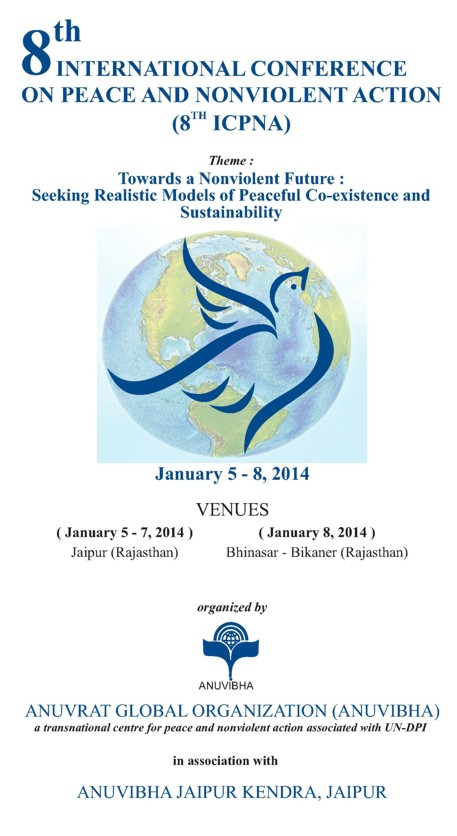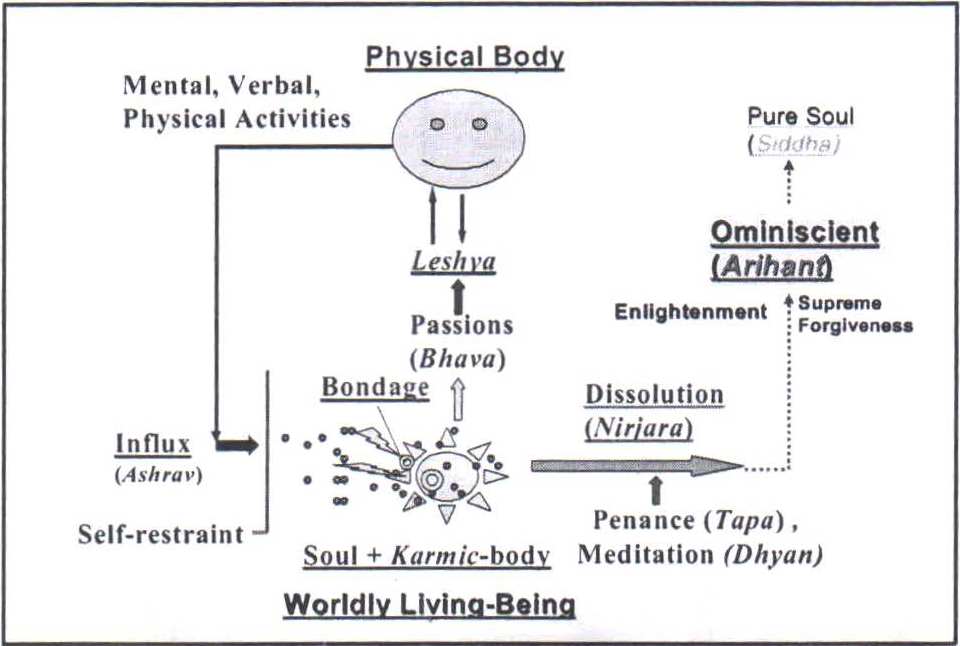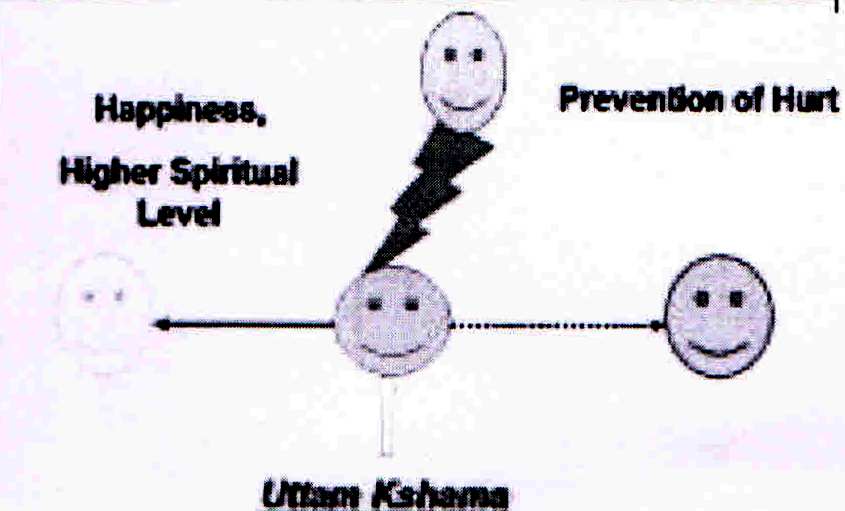 | 8th International Conference on Peace and Nonviolent Action |
A Jain Concept and Practice for Spiritual Progress, Social Harmony and Peace
Concept of Forgiveness in Jain PhilosophyIn social interactions, occurrences of conflict, interpersonal offenses and hurt happen frequently. Most persons generally react to such events with toxic emotions of anger and avoidance, or revenge giving rise to cycles of violence and counter-violence, resulting in injuries, mental anguish and ill health, both in the perceived offenders and victims. To avoid these painful situations, Jainism and most other religions have prescribed and encouraged forgiveness for thousands of years as a more desirable positive and sublime response to hurt and offense during conflicts (McCullough and Worthington, 1999; Petersen, 2009). The theistic religions, including the Abrahamic traditions (Judaism, Christianity and Islam) and some sections of the Hindu traditions (Sanatana Dharma), for example, associate and attribute forgiveness directly to GOD. To quote the famous English poet Alexander Pope: “to err is human, to forgive is divine.” In contrast, the non-theistic religions, Jainism and Buddhism, derive forgiveness from the nature of the soul (jīva/ātman) and virtue of compassion (loving kindness or metta) respectively. Thus, the religious roots, the meaning of the concept of forgiveness, its underlying basis, the emphasis and its practice differ significantly in various religious traditions. During the last few decades, the importance of the ancient religious concept of forgiveness has also been recognized in modern scientific circles (Worthington, 2005). Interestingly, after the terrorist attacks on 11 September 2001 on the World Trade Center in New York, theoretical and empirical studies on forgiveness and its applications by psychologists, sociologists and biomedical scientists have grown almost exponentially. From the view-point of modern psychology, forgiveness can be conceptualized as a multidimensional construct that is formed by interplay between cognition, emotion and behavior. It is considered as a complex act of consciousness that liberates the psyche from the harmful emotion of anger, the need for personal vengeance and the perception of the self as a victim. Recent empirical researches indicate that individuals may differ greatly in their capacities to forgive. To forgive or to ask for forgiveness appears to be a complex psycho-social process that depends upon personality factors involving cognitive, emotional and spiritual aspects. Disposition to forgive, considered a personality trait, is subject to modulation by a number of internal and external variables. Religiosity and spirituality are among the important factors, which directly correlate with the disposition to forgive (McCullough. 2001; Piedmont and Leach, 2002).
Forgiveness Correlates with the Purity of the Soul (Self)Jainism, the most ancient of world religions, assigned unique meaning to the concept of forgiveness and attached great importance to it for the practice of Ahinsa, the supreme pathway for spiritual progress of the individual, social harmony and peace essential for the all-round sustainable development. According to Jain metaphysics, a worldly living-being is a blend of two independent substances: (1) soul (jīva/ātma), a formless unobservable entity, functioning as consciousness (chetana) and (2) matter (pudgala), the observable physical substrate constituting the various body-forms that enable consciousness to be manifested. The gross physical bodies survive for limited life-spans, after death the soul adopts a new body-form (rebirth). Forgiveness is considered to be one of the inherent natural attributes of the soul (jīva/ātma). We shall discuss this concept of forgiveness and its practice in relation to the wellness and spiritual evolution of the individual living-being and the beneficial impact this brings to the shared social environment both from the transcendental (nishchayanaya) and the pragmatic (vayavaharnaya) points of view.
The Pathway and Processes of Self-PurificationFrom the transcendental self-referential point of view, everysoul in its pure passionless state of equanimity, spontaneously expresses supreme forgiveness (Uttam Kshama) that is unconditional and universal. However, the soul-states of mundane worldly living beings (sansarikjiva) are impure and contaminated with passions because of bondage with karmas. According to Jain philosophy, the karmas are special types of very subtle material particles, (we may call them karmons), which are attracted and get attached to the soul as a consequence of acts, feelings and thoughts of passions. Bondage with karmas, constituting the subtle karmic-body, hinders the full expression of the spiritual attributes. Levels of expression of forgiveness depend, therefore, inversely on the karmic bondage and relate directly to the stages and degrees of spiritual purity. Spiritual practices aiming to purify the soul (self-purification) should, therefore, enhance the level of expression of forgiveness
Realization of the true nature of the Self is the only real pathway for the evolution of Uttam Kshama. Rational vision (Samyak darshan) and rational knowledge (Samyak jñāna) provide the essential basis for right conduct (Samyak charitra) necessary for self-purification and attaining the passionless state of perfect equanimity (vītrāgata). Self-efforts (purushārtha) to realize the true nature of the self can initiate appropriate alterations in karma dynamics to facilitate the processes of self-purification and enhance the disposition to forgive. Karma-dynamics is determined by the influx (ashrava) of karmons, their bondage (bandha) with the soul and dissolution (nirjara) as shown schematically in Fig. 1.

Fig. 1: Karma-Dynamics, Spiritual Purification
and Evolution of Supreme Forgiveness
The influx and bondage are caused by the mental, vocal and physical activities of the living-being and the strength of bondage depends on the intensities of the associated passions (such as anger, pride, deceit, greed). The type of bondage is determined by the nature and number of karmons, as well as the strength and duration of the bonds. Self-purification progresses through the reduction of the karmic-body. The influx of karmons can be inhibited (samavara) by efforts to practice self-restraint (sanyam) to check the stream of toxic emotions (kashaya) of anger, pride, deceit and greed. The dissolution of the karmic-bondage occurs as a natural process of shedding after activation and completion of the bond duration. Spiritual practices like introspection-repentance for non-observance of ethical practices (pratikraman), penance (tapa) and meditation (dhyana) to realize the true nature of the self (soul), can significantly accelerate the processes of dissolution of karmas. With the elimination of all the destructive (ghatiya) Karmons from the soul, the worldly soul becomes purified, attains the passionless, equanimous, enlightened, blissful omniscient state (Arihant) that is endowed with the spontaneous expression of universal and unconditional forgiveness. Finally, after complete dissolution of the karmic-and the gross physical-body, the soul (jiva) becomes free of its bondage from matter and gets liberated from the cycle of birth, death and rebirth (Siddha). Supreme forgiveness is an inherent attribute of the basic benevolent nature of the soul and does not depend in anyway on the extrinsic circumstances such as expression of an apology and repentance from the offender or retributive punishment meted out to him. Thus, Uttam Kshama is expressed spontaneously, unconditionally and universally. A person having a psychic disposition for supreme forgiveness does not feel hurt by any offence, is not angry, has no desire for revenge and attains a higher Spiritual State enhancing peace and happiness (Fig. 2).

Fig. 2: Effects of Supreme Forgiveness
on Happiness and Spiritual Progress
Table 1: Summary of Successive Lives of Marubhuti and KamathThe biography of the 23rd Tirthankar Parshawanath (born in Varanasi, in 877 BCE) and the legends associated with his ten previous lives narrated in Jain Purāṇas (see for example: Adipuran by Acharya Jinsen; Pasanah-cariuby Budha Sridhar) illustrate the significance of developing the disposition of instant, unconditional, universal and absolute forgiveness (Uttam Kshama or Supreme Forgiveness) for spiritual progress. In contrast, a person with disposition that is deficient in the trait of forgiveness suffers the consequences of anger, vengeance and violence as demonstrated by the behavior and fate of Kamath:
The legends recount stories of ten past lives (see Table 1) starting from Parshva’s tenth previous life when he was named Marubhuti, the son of a royal priest in the court of king Arvind, the ruler of Podanpur in Bharat kshetra of Jambudvipa. Marubhuti was simple, humble and forgiving but his elder brother Kamath was a bad character, jealous, full of deceit and revenge. His father being a religious and pious person renounced the worldly life to become an ascetic. King Arvind appointed Marubhuti in his father.s place ignoring the elder brother Kamath.
Marubhuti, offended, angry Kamath, humiliated, revengeful, requests forgiveness, kills Marubhuti:
Forgiveness for Social Harmony and Peace
* Elephant, leads life of restraint
Snake, Bites & kills
* Deva (Sahstrar heaven)
5 th Hell
* Vidyadhar king Python,
Swallows
* Deva (Achyut heaven)
6 th Hell
* Chakravarti Bheel
Kills by Arrow
* Ahmindra (Greyavak heaven)
7 th Hell
* KingAnand Lion
Attacks & Eats
* Indra (Aanat heaven)
4 th Hell
* Tirthankar Parshvanath,
Demon Shambhar,
meditates undisturbed, tortures Parshvanath,
attains Enlightenment repentsKamath seduces the beautiful wife of his younger brother while Marubhuti was away on a mission with king Arvind. On learning about this on his return and verifying by his own eyes, sad and angry Marubhuti complains to the King, who punishes and orders Kamath to leave his kingdom. After a few days, Marubhuti started missing his brother and was full of remorse considering himself responsible for his brother.s misfortune and suffering. Marubhuti sets out in search of Kamath and finds him among a group of mendicants practicing painful exercises and self-torture. Marubhuti asks for forgiveness for causing hurt and requests Kamath to return home. Kamath gets annoyed, picks up a rock and throws it on the head of Marubhuti killing him instantly. King Arvind on hearing the tragic news became detached and renouncing his worldly life decided to lead the life of a monk.
Marubhuti was reborn as an elephant in a forest. Once, Muni Arvind was practicing deep meditation in the same area. The elephant, on seeing the Muni meditating in kayotsarga posture with the vision focused on the tip of the nose, became very calm and stood watching him. Muni Arvind opened his eyes and knowing through clairvoyance that the elephant standing before him was the reincarnation of Marubhuti addressed him thus: “O Elephant King, remember that you are the reincarnation of Marubhuti, the royal priest of Podanpur. Your elder brother had seduced your wife and murdered you. You are born as an elephant because you had unpleasant and sad feelings at the time of death. Now you should maintain pious intentions and practice self-restraint and good conduct so that you can get rid of your inauspicious karma and get liberated.” The elephant remembering his past life, recognized the Muni as King Arvind, his master and decided to follow his advice. After the departure of the Muni, the elephant indeed led a life of restraint, fasting, avoiding hurting anybody and being helpful to its fellow creatures. One day a fire broke in the forest. To save itself from fire, the elephant took shelter in a mud-pond. Kamath, after his death, was also born as a poisonous serpent in the same forest. On seeing the elephant, the serpent recognized it as the enemy responsible for humiliation in the previous birth. The serpent bit the elephant in revenge, who died peacefully tolerating the pain and was subsequently reborn as Deva in heaven. The serpent was reborn in the 5th hell.
The cycle of anger, revenge, hurt and violence from Kamath and tolerance and forgiveness without any malice or violence on the part of Marubhuti continued for a long time during several incarnations (summarized in Table 1). Due to his bad intentions and cruel deeds, Kamath had to suffer untold pain in hell, while Marubhuti, because of his virtuous intentions and auspices Karma, enjoyed the pleasures in heaven.
In the last birth Marubhuti was reborn as Parshvanath (son of the king and queen of Varanasi). One day Prince Parshva saw Hermit Mahipala (incarnation of Kamath) performing Pañchāgni Tapa. Surrounded by burning fires all around, unmindful of causing injury to others, he was cutting firewood to add to the fires. Parshvanath, endowed with clairvoyance, asked him to stop and exclaimed.... There dwell in that log a serpent couple, please do not hurt them. The hermit did not believe him, got annoyed and did not stop, thereby cutting the snakes into pieces. Prince Parshva recited Namokar Mantra to the dying Serpent Couple. Parshvanath, who was then 30 years of age, felt very sad watching and reflecting on the sufferings of innocent beings, decided to renounce the world and adopted the life of an ascetic.
The serpents were reborn in heaven as Deva Dharnendra and Devi Padmavati. Humiliated, the hermit died and was born as a Demon God named Shambhar. While Parshawa was meditating on the nature of pure soul, Shambhar, remembering the events of past life, started to torture him to take revenge. Dharnendra & Padmavati, who were grateful to Parshawa, descended from heaven to offer protection against Upasarga by the Demon Shambhar (Kamath). Parshvanath, undisturbed by the torture, continued meditation and contemplation of the Pure-Self, thereby attaining enlightenment and omniscience (Kevala jñāna). Eventually, Kamath in the incarnation of demon Shambhar realized his mistakes, repented and asked for forgiveness.
This legend, associated with Tirthankar Parshvanath, beautifully illustrates the crucial beneficial role of forgiveness in spiritual uplift, mental peace, enlightenment and bliss. Un-forgiveness and revenge, in contrast, lead to spiritual decline and continued suffering (experienced by Kamath during subsequent rebirths).
The Kshama-vani Diwas (Forgiveness Day)The primary focus on forgiveness in Jainism is for the spiritual progress and enlightenment of the individual. However, from the other-referential and practical view-point (vayvaharnaya), the practice of forgiveness is instrumental in effectively reducing aggressive behavior/violence and enhancing good interpersonal relationships and social harmony. In fact, the individual benefit and social good are interwoven, since the worldly living-beings are mutually interdependent for their mundane existence: “Parasparo-Pagraho Jīvanam.”: Living-Beings function to help each other. Umāswāmi in Tattvārtha-sūtra We need to interact in a cooperative mode with other living beings and the environment. Competitions and conflicts erode social cohesion. During interpersonal interactions within a family or a social group, hurts/injuries occur frequently by accident (unintentionally) or through planned actions (intentionally). After such events, anger and revenge are destructive and harmful giving rise to unending spirals of violence. Seeking and granting unconditional forgiveness, even in the events of grave provocations, by the perceived offenders and victims, on the other hand, are prosocial positive responses, which help in restoring relationships and promote personal as well as social wellness - so essential for peaceful co-existence. Several recent empirical studies carried out at various levels by sociologists and biomedical scientists have provided strong evidence supporting these statements.
Relevance of Forgiveness in Modern TimesRecognizing the significance of enhancing forgiveness in the worldly life, Jains celebrate Kshama-vani Diwas (Forgiveness Day) devoted to introspection, seeking and granting unconditional forgiveness. The forgiveness day is observed every year (August/ September) at the conclusion of the great spiritual festival of Das Lakshan Dharam Maha Parva, also known as Paryushan Parvāḥ, dedicated to self-purification for spiritual evolution. The festival starts on the 5th day of the bright fortnight in the month of Bhadrapad. according to the Hindu calendar and continues for ten days. Each day is focussed, in particular, to the observance of one of the ten inherent attributes/virtues (dharma) of the soul. The ten spiritual attributes are:
- Forgiveness (Kshama.)
- Straightforwardness (Ārjava)
- Humility, Modesty (Mārdava)
- Purity of thought, Contentment (Śhaucha)
- Truth (Satya)
- Self-Restraint (Saṁyama)
- Austerity, Penance (Tapa)
- Renunciation (Tyāga)
- Non-attachment (Ākiṁcanya)
- Celibacy (Brahmācārya)
The first day of the festival is devoted to cultivating and enhancing the expression of Supreme Forgiveness (Uttam Kshama). underscoring the great importance of a forgiving disposition in the processes of self-purification and spiritual evolution. Celebration of Forgiveness Day after the conclusion of the ten day festival, getting rid of all toxic emotions of anger, pride, deceit and greed, following the path of truth and self-restraint, is an appropriate occasion to seek and grant forgiveness to all living creatures of the world, who might have been hurt, knowingly or unknowingly, by one’s actions, words or thoughts. On this day followers of Jainism traditionally approach their friends, relatives, colleagues, adversaries and enemies with humility to communicate their feelings with the following words:
Khamemi Savve Jiva, Savve Jiva Khamantu Mi Mitti Me Savvabhuesu, Verammajjhamna Kenai
“I forgive all the living beings of the universe, and may all the living beings forgive me. I have friendship with everyone any animosity towards none.”
The practice of celebrating Forgiveness Day in this manner provides excellent opportunity to renew friendships, eschew feelings of revenge, reduce social tensions and gain mental peace. Furthermore, it is a forward step towards spiritual upliftment.
ConclusionsDevelopment of a disposition expressing a high degree of forgiveness is very relevant to modern times where anger, hate, violence and terror are increasingly threatening the spiritual, mental and physical health at the personal level and sustainable socioeconomic development and peace at the global level.
Practicing true forgiveness in real life is very difficult, however, despite all the teachings and awareness of potential benefits. A recent empirical study, conducted among young students in USA, indicated that most common motivations for forgiving were neither empathic nor altruistic, but self-oriented, for example, repair of an important relationship or prevention of harmful stress. Further, the reasons to forgive or not to forgive were also conditioned by the offender’s behavior. Rendering apology, expression of remorse or offering compensation by the offender frequently facilitated forgiveness (Younger et al., 2004).
Considering the practical aspects, it may appear that the ideal of practicing unconditional and spontaneous forgiveness as conceived and propagated in Jain traditions would be almost unachievable in practice. In this connection, the important roles of religious-spiritual traditions, cultural background and sincere and committed efforts need to be emphasized. A firm belief in the Jain world-view based on (a) karma-doctrine reflecting the operation of the principle of causality in an interconnected universe, (b) Anekantavada, emphasizing the multifaceted view of reality and (c) Ahimsa, nonviolence, the supreme ethical pathway leading to the cherished goals of enlightenment and liberation, helps the proponents to a great extent in controlling the toxic emotions of anger and revenge. Jain scriptures also recommend a number of spiritual practices, for example the six essentials (Shat-Awashyak) followed by devout Jains even today, to develop a rational attitude (samayakdarshan) to understand the multifaceted aspects of realty, to cultivate objectivity and equanimity (veetragata), enhancing thereby the process of self-purification and the capacity to forgive. Constant endeavors to observe these principles and practices will ultimately enable individuals to achieve the desired objectives to a great extent. The full development and expression of supreme forgiveness evolves and emerges with spiritual progress uplifting consciousness to higher planes - this may sometimes take a long time, even extending over several lives, as illustrated by the biography of the Tīrthaṅkara Parshvanātha.
It is also interesting to note that according to evolutionary biologists, forgiveness is a basic trait common to many animal species. This is in agreement with the Jain view that forgiveness is an inherent benevolent natural trait of all living-beings and can be developed to a higher degree in spiritually advanced humans, who have higher levels of consciousness. The capacity to forgive is a complex biological adaptation extending throughout the animal kingdom (Wilson, 2002), which evolved as a regulatory mechanism to restore interpersonal relationships and mutual cooperation that provide survival advantage. The gene-based kin selection theories also suggest that individuals with benevolent attitudes sacrificing their self-interests for their group or for their relatives will be favored by natural selection. Inability to forgive has been shown to induce chronic stress and disease, whereas forgiveness enhances health by reducing psycho-social stress and fatigue, lowering blood pressure and lower-back pain, reducing anxiety, depression and psychopathology and promoting immune responses (Worthington et al., 2007).
ReferencesIn view of the above discussion, it is suggested that the Jain concept of Uttam Kshama as a natural attribute of the Self, practices of self-purification and traditions of celebrating the Forgiveness Day, for seeking forgiveness and granting unconditional forgiveness to all, are of great value to the individual and also to the society, hence deserve to be made popular among people at large, irrespective of caste, race, gender, age and faith. Furthermore, comprehensive interdisciplinary theoretical and experimental research studies to evaluate inhibition of anger by self-control and enhancement of forbearance and the disposition to forgive by Jain spiritual practices such as introspection (pratikraman), contemplation (anupreksha) and virtuous meditation (Dharma Dhyana) are warranted. Imparting training in self-control especially to children at an early age is likely to be an effective strategy that needs to be explored. Hopefully, practicing and enhancing forgiveness would contribute significantly in realizing the vision of a non-violent world, without wars and weapons, where all living-beings will coexist in harmony.
Acharya Jinsen (1988): Adipuran. (Hindi translation, edited. by PannaLal Jain), Bharatiya Jnanpith, New Delhi.
Budh Shridhar (2006): Pasanah Chariu. (Hindi translation, edited by Raja Ram Jain), Bharatiya Jnanpith, New Delhi.
Umaswati, Tattvartha Sutra(1994). (English Translation by Nathmal Tatia as That Which Is), Harper Collins, London.
McCllough, M.E. (2001): 'Forgiveness: Who Does It and How Do, They Do It?' in Current Directions in Psychological Science, 10, 194-197.
McCllough, M.E., and Worthington E.L. (1999): 'Religion and the Forgiving Personality' in Journal of Personality, 76, 1141-1164.
Petersen, L.E. (2009): 'Forgiveness and Religion: A Schematic Approach' in ARA Journal, 2009, 61. 64.
Piedmont, R. and Leach, M. (2002): 'Cross-Cultural generalizability of the spiritual transcendence scale in India - Spirituality as a universal aspect of human experience' in American Behavioral Scientist, 45, 1888-1901.
Younger J.W., Piferi, R.L, Jobe, R.L., Lawler, K. A. (2004): 'Dimensions of forgiveness: The views of laypersons' in Journal of Social and Personal Relationships, 21, 837-855.
Wilson D.S (2002).: Darwin's Cathedral: Evolution, Religion, and the Nature of Society, University of Chicago Press, Chicago.
Worthington, E.L. Jr., Witvliet, C.V., Pietrini, P. and Miller, A.J. (2007): 'Forgiveness, health, and well-being: a review of evidence for emotional versus decisional forgiveness, dispositional forgiveness, and reduced unforgiveness' in Journal of Behavioral Medicine
30, 291-302.
 Dr. Phil. Nat. Viney Jain
Dr. Phil. Nat. Viney Jain